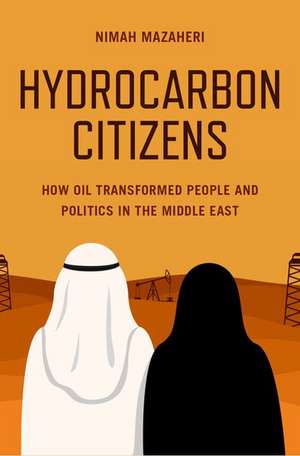Hydrocarbon Citizens: How Oil Transformed People and Politics in the Middle East
Autor Nimah Mazaherien Limba Engleză Hardback – 6 feb 2023
Preț: 225.23 lei
Preț vechi: 242.95 lei
-7% Nou
Puncte Express: 338
Preț estimativ în valută:
43.11€ • 46.84$ • 36.24£
43.11€ • 46.84$ • 36.24£
Carte disponibilă
Livrare economică 20-26 martie
Livrare express 15-21 martie pentru 48.28 lei
Preluare comenzi: 021 569.72.76
Specificații
ISBN-13: 9780197636725
ISBN-10: 0197636721
Pagini: 264
Dimensiuni: 240 x 162 x 23 mm
Greutate: 0.54 kg
Editura: Oxford University Press
Colecția OUP USA
Locul publicării:New York, United States
ISBN-10: 0197636721
Pagini: 264
Dimensiuni: 240 x 162 x 23 mm
Greutate: 0.54 kg
Editura: Oxford University Press
Colecția OUP USA
Locul publicării:New York, United States
Recenzii
In this brilliant new book, Mazaheri masterfully shows how oil wealth affects an overlooked, if not forgotten, group—the average person in an oil-rich country. Using a veritable trove of survey data from the Middle East, Mazaheri paints an intricate and empirically rigorous portrait of this 'hydrocarbon citizen' to show how oil wealth creates positive attitudes of government and fosters reduced criticism of rulers. This book is essential reading for anyone looking to understand the deep micro-level impacts of oil, as well as how citizens in oil-rich states will ultimately confront the clean energy transition.
We have a wealth of studies of the macrostructural consequences of oil for democratic regimes, economic growth, civil wars, and state institutions. Until now, we have suffered a dearth of studies at the micro-level, especially the political attitudes of citizens of oil states. Nimah Mazaheri's work demonstrates that hydrocarbon citizens in the Middle East are on average more likely to rate government performance positively and less likely to value democracy. These attitudes, which vary according to demographic features of subgroups, follow directly from three features of oil wealth: its volatility, its geographic concentration in remote areas leading to direct control by the state, and the history of nationalist struggle against foreign control and exploitation. Hydrocarbon Citizens is a major contribution to our understanding of Middle East politics.
Oil wealth can be a mixed blessing for a nation's political economy. Focusing on everyday individuals in these societies, Mazaheri meticulously studies the attitudes of 'hydrocarbon citizens'. Notably, the typical hydrocarbon citizen is more likely to hold negative views towards democracy; an insight that has profound implications for the possibility of democratic reforms in many Middle Eastern societies. This is a must read for scholars of the Middle East, natural resources, democracy, and public opinion.
In a masterful use of statistical techniques, including ordered logistic models, Mazaheri shows that hydrocarbon citizens, notably those employed in government ministries, are more loyal consumers of various services than inhabitants of other Arab states and are less enthusiastic about democracy.
We have a wealth of studies of the macrostructural consequences of oil for democratic regimes, economic growth, civil wars, and state institutions. Until now, we have suffered a dearth of studies at the micro-level, especially the political attitudes of citizens of oil states. Nimah Mazaheri's work demonstrates that hydrocarbon citizens in the Middle East are on average more likely to rate government performance positively and less likely to value democracy. These attitudes, which vary according to demographic features of subgroups, follow directly from three features of oil wealth: its volatility, its geographic concentration in remote areas leading to direct control by the state, and the history of nationalist struggle against foreign control and exploitation. Hydrocarbon Citizens is a major contribution to our understanding of Middle East politics.
Oil wealth can be a mixed blessing for a nation's political economy. Focusing on everyday individuals in these societies, Mazaheri meticulously studies the attitudes of 'hydrocarbon citizens'. Notably, the typical hydrocarbon citizen is more likely to hold negative views towards democracy; an insight that has profound implications for the possibility of democratic reforms in many Middle Eastern societies. This is a must read for scholars of the Middle East, natural resources, democracy, and public opinion.
In a masterful use of statistical techniques, including ordered logistic models, Mazaheri shows that hydrocarbon citizens, notably those employed in government ministries, are more loyal consumers of various services than inhabitants of other Arab states and are less enthusiastic about democracy.
Notă biografică
Nimah Mazaheri is an Associate Professor of Political Science at Tufts University. His research and teaching are centered in the fields of public policy, political economy, and energy studies. He is the author of Oil Booms and Business Busts: Why Resource Wealth Hurts Entrepreneurs in the Developing World. He held postdoctoral appointments at Princeton University and Harvard University, and has worked as a consultant for international development agencies.
